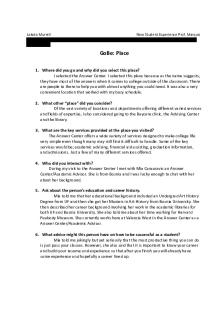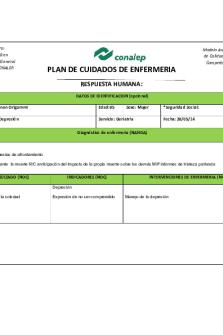A Small Place - Kincaid summary PDF

| Title | A Small Place - Kincaid summary |
|---|---|
| Course | The Craft of Writing |
| Institution | MacEwan University |
| Pages | 5 |
| File Size | 83 KB |
| File Type | |
| Total Downloads | 60 |
| Total Views | 173 |
Summary
Summary...
Description
A Small Place Summary A Small Place is divided into four loosely structured, untitled sections. The first section begins with Kincaid’s narration of the reader’s experiences and thoughts as a hypothetical tourist in Antigua. The reader, through Kincaid’s description, witnesses the great natural beauty of the island, while being sheltered from the harsher realities of the lives of those who must live there. Kincaid weaves into her narrative the sort of information that only an “insider” would know, such as the reason why the majority of the automobiles on the island are poorly running, expensive Japanese cars. Included in her guided tour are brief views of the mansions on the island, mostly gained through corruption or outright criminality. She also mentions the nowdilapidated library, still awaiting repairs after an earthquake ten years earlier. The tour continues at the hotel, and Kincaid concludes the section with a discussion of her view of the moral ugliness of being a tourist. The second section deals with Kincaid’s memories of the “old” Antigua, the colonial possession of Great Britain. Kincaid recalls the casual racism of the times, and the subservience of Antigua to England and, especially, to English culture. She delves briefly into the history of Barclay’s Bank and discusses the Mill Reef Club, an elite, all-white enclave built by wealthy foreigners. She describes and deplores the great hoopla made over the visit of Princess Margaret to the island when Kincaid was a child. Much of the section is concerned with the distortions that colonialism has created in the minds of the Antiguans; Antiguans do not tend to recognize racism as such, says Kincaid, and the bad behavior of individual English people never seems to affect the general reverence for English culture. For Kincaid, the problem is compounded by the fact that the people of Antigua can express themselves only in the language of those who enslaved and oppressed them. She then discusses the connection she sees between the colonial past of the island and its impoverished, corrupt present. The third section, the longest, deals with Antigua’s present and begins with Kincaid asking herself the disturbing question of whether, considering the state of the island today, things weren’t, in fact, better in the old days. As an example, she takes the state of the library, awaiting repairs after all these years and forced to reside in “temporary” quarters above a dry goods store. Kincaid has fond, if ambivalent, feelings toward the old library, which was a haven of beauty and an escape into reading for her as a child. She recalls the imperious ways of the head librarian (who suspected Kincaid, rightly, of stealing books), who is now sadly reduced to campaigning, mostly unsuccessfully, for funds to build a new library, while the collection decomposes in cardboard boxes. The rich members of the Mill Reef Club have the funds to help, but will do so only if the old library is rebuilt—a demand that Kincaid sees as having more to do with nostalgia for the colonial regime than with a true desire to help. Kincaid mentions the
ironies involved in Antigua having a Minister of Culture without having a culture to administer. She also mentions her politically active mother’s run-in with the current Minister of Culture, who has allowed the library to languish. Education has clearly suffered on Antigua in the years since independence, and Kincaid ruefully notes the poor speech habits of the younger Antiguans. Kincaid discusses the way Antiguans experience the passage of time, and connects this to their oddly detached view of the corruption of their government. She then goes into a litany of the many abuses of power on the island, including misappropriation of funds, kickbacks, drug smuggling, and even political violence—all of which are known by the average Antiguan. Kincaid then discusses the political history of Antigua since independence, showing how power has rested in the same hands for most of the period, with one brief, unimpressive exception. Kincaid sees corruption as an ingrained element of political life on the island, so much so that government officials who do not steal are held in contempt as fools rather than admired for their honesty. She tells of the fears that many Antiguans have for the future and hints that open dictatorship or political upheaval may lie ahead. The fourth, and final, section is a sort of coda to the piece, starting with an evocation of the intense physical beauty of the island. She describes the beauty as so extreme as to appear “unreal,” almost like an illustration or a stage-set. Kincaid says that the beauty of their surroundings is a mixed blessing to the Antiguans, who are trapped in an unchanging setting in which their poverty is part of the scenery. The slaves who were brought to Antigua by force were victims, and therefore noble—but their descendants, today’s Antiguans, are simple human beings, with all the problems and contradictions of human beings anywhere.
Themes The Ugliness of Tourism For Kincaid, tourists are morally ugly, though in her description of fat, “pastrylike-fleshed” people on the beach, she shows that physical ugliness is part of tourism as well. The moral ugliness of tourism is inherent in the way tourists make use of other, usually much poorer, people for their pleasure. Kincaid is not referring to direct exploitation of others (though she does mention one government minister who runs a brothel); rather, she refers to a more spiritual form of exploitation. According to Kincaid, a tourist travels to escape the boredom of ordinary life—they want to see new things and people in a lovely setting. Kincaid points out that the loveliness of the places that tend to attract tourists is often a source of difficulty for those who live there. For example, the sunny, clear sky of Antigua, which indicates a lack of rainfall,
makes fresh water a scarce and precious commodity. For tourists, however, the beauty is all that matters—the drought is someone else’s problem. Others’ problems can even add to the attraction of a place for tourists. Kincaid notes that tourists tend to romanticize poverty. The locals’ humble homes and clothing seem picturesque, and even open latrines can seem pleasingly “close to nature,” unlike the modern plumbing at home. Kincaid believes that this attitude is the essence of tourism. The lives of others, no matter how poor and sad, are part of the scenery tourists have come to enjoy, a perspective that negatively affects both tourists and locals. The exotic and often absurd misunderstanding that tourists have of a strange culture ultimately prevents them from really knowing the place they have come to see. Admiration vs. Resentment of the Colonizer Kincaid observes the quality of education on Antigua, as well as the minds of its inhabitants, and remains deeply ambivalent about both. She herself is the product of a colonial education, and she believes that Antiguan young people today are not as well-educated as they were in her day. Kincaid was raised on the classics of English literature, and she thinks today’s young Antiguans are poorly spoken, ignorant, and devoted to American pop culture. However, one of the things Kincaid despises most about the old Antigua was its cultural subservience to England. If young Antiguans today are obsessed with American trash, in the old days they were obsessed with British trash. One of the insidious effects of Antiguans being schooled in the British system is that all of their models of excellence in literature and history are British. In other words, Antiguans have been taught to admire the very people who once enslaved them. Kincaid is horrified by the genuine excitement the Antiguans have regarding royal visits to the island: the living embodiment of British imperialism is joyously greeted by the former victims of that imperialism. Antiguans’ minds have been shaped from the bottom up by the experience of being enslaved and, later, colonized. This intimate shaping determines the contours of daily life and even private thoughts. For example, the young Kincaid’s greatest pleasure is in reading, but everything she reads is tainted by bitterness, since she is learning the dominant culture from the position of a dominated people. English is her first language, and Kincaid complains that even her critique of colonialism must be expressed in the words she learned from the colonialists themselves. Kincaid doesn’t feel at home in either world. She will never be truly English because of race and history, yet her intimacy with English culture expands her horizons far beyond the small boundaries of Antigua. Thanks to slavery and to being ruled from afar for so long, the Antiguans have become accustomed to being passive objects of history, rather than
active makers of it. The experiences of the colonized are therefore always secondary in some sense; it is the people from the “large places” who determine events, control history, and even control language. The Prevalence of Corruption For Kincaid, corruption is related to colonization in that it is a continuation of the oppression of colonialism—except that corruption turns the once-colonized people against themselves. Kincaid insists that corruption pervades every aspect of public life in Antigua, that everyone knows about it, and that no one seems to know what to do about it. Government ministers run brothels, steal public funds, and broker shady deals, but there is a conspicuous lack of outrage on the part of the public. Kincaid attributes this lack of anger to the Antiguans’ general passivity, but she also sees their attitude as a logical reaction to the “lessons” of Antiguan history. The British claimed to be bringing civilization to the colonized territories while actually exploiting them and taking from them as much as they could. Naturally, when the Antiguans themselves came to power, they followed the example they had been given: under the motto “A People to Mold, A Nation to Build,” their ministers claim to be working for the greater good while lining their own pockets.
Direct Address to the Reader Kincaid speaks directly to the reader throughout A Small Place, even accusing the reader of taking part in the moral ugliness of tourism. Kincaid begins by describing what the reader might see and think as a visitor to Antigua, and she refers to what “you” are probably thinking as “you” read. This direct address has two effects. First, it emphasizes that, from the Antiguans’ point of view, the reader is just as much a part of a generalized group as they are, and that he or she will not be seen as an individual but as a stereotype. Second, it forces the reader to consider the ways in which he or she does, in fact, fit Kincaid’s stereotype of a tourist. Anyone who has traveled to the tropics in search of a relaxing “getaway” is likely to find reading A Small Place uncomfortable due to Kincaid’s accusing, sarcastic tone. By addressing the reader this way, Kincaid hopes to intensify her angry denunciation of the state of things in Antigua by pointing her finger directly at the reader and anticipating the reader’s criticism. For Kincaid, any alienation that the reader feels is part of the plan.
“Unreal” Beauty Throughout A Small Place, especially in the final section, Kincaid pauses to illustrate Antigua’s natural beauty. She describes the intense colors, the unrelenting sunlight, and the sea. She frequently uses the word “unreal” to describe the scenery, as though everything looks too perfect to be believable. This idea of unreality is part of what Kincaid sees as the effect of the island’s beauty on those who live or travel there. For tourists, everything, including the Antiguans themselves, is a kind of movie backdrop, a stage set up for their own enjoyment. The history and the sufferings of others are incidental, forgettable. For the Antiguans, the unchanging quality of the beauty suggests that their own lives are peripheral to a larger plan. When nothing changes, there is no sense of history or hope of development to motivate people. For Kincaid, the landscape is a determining factor in life on the island, but something morally neutral—the Antiguans’ daily blessing and their historical curse....
Similar Free PDFs

A Small Place - Kincaid summary
- 5 Pages

A Small Place
- 10 Pages

Babcock Place - Grade: A
- 1 Pages

Jamaica Kincaid Bio - Lecture
- 2 Pages

When Place Matters - Grade: A+
- 4 Pages

1.7 Description of a Place
- 1 Pages

Go Be (Place) - Grade: A
- 2 Pages

Jamaica Kincaid - English
- 2 Pages

Girl by jamaica Kincaid
- 2 Pages

The South is a Place to Stay
- 8 Pages

Depresion - PLACE
- 3 Pages

Asma - PLACE
- 2 Pages
Popular Institutions
- Tinajero National High School - Annex
- Politeknik Caltex Riau
- Yokohama City University
- SGT University
- University of Al-Qadisiyah
- Divine Word College of Vigan
- Techniek College Rotterdam
- Universidade de Santiago
- Universiti Teknologi MARA Cawangan Johor Kampus Pasir Gudang
- Poltekkes Kemenkes Yogyakarta
- Baguio City National High School
- Colegio san marcos
- preparatoria uno
- Centro de Bachillerato Tecnológico Industrial y de Servicios No. 107
- Dalian Maritime University
- Quang Trung Secondary School
- Colegio Tecnológico en Informática
- Corporación Regional de Educación Superior
- Grupo CEDVA
- Dar Al Uloom University
- Centro de Estudios Preuniversitarios de la Universidad Nacional de Ingeniería
- 上智大学
- Aakash International School, Nuna Majara
- San Felipe Neri Catholic School
- Kang Chiao International School - New Taipei City
- Misamis Occidental National High School
- Institución Educativa Escuela Normal Juan Ladrilleros
- Kolehiyo ng Pantukan
- Batanes State College
- Instituto Continental
- Sekolah Menengah Kejuruan Kesehatan Kaltara (Tarakan)
- Colegio de La Inmaculada Concepcion - Cebu



